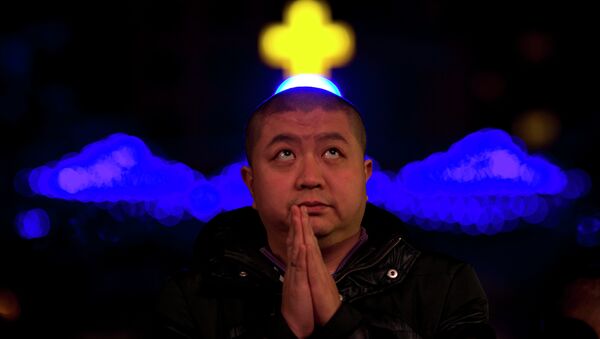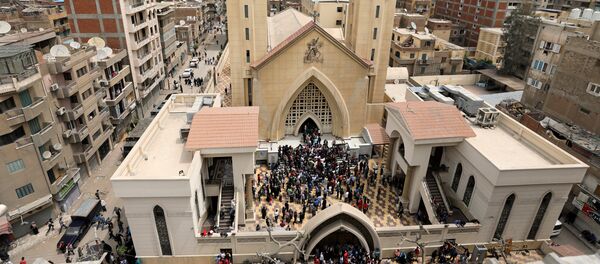"This does not necessarily mean that the Church has to agree completely with Party politics and values, but it must find a flexible and effective way to continue its mission and ministry in China," he wrote.
The article is echoed by a training session for the Catholic clergy and laity held by China's State Administration for Religious Affairs last week. Officials called upon 150 Catholic representatives to continue the mission of sinification, be patriotic and hold up the principle of Church independency.
Apart from ideology, the article also encouraged the Church to use digital technology and social media, such as WeChat and Weibo, to evangelize in China and share gospel values in a more efficient and effective way.
Father Jiang's article has been seen by many as representing an important voice in the Vatican regarding its strategy in China. It's also a signal of goodwill amid the ongoing China-Vatican dialogue on forging diplomatic relations, the progress of which seems to have slowed down in recent months.
"I think it is a very important article because it signals another step forward after Pope Benedict's 2007 letter to the Chinese," Francesco Sisci, a senior researcher at the Center of European Studies at the Renmin University of China and a Vatican affairs expert, told the Global Times, referring to the letter that attempted to bring a new chapter to the relationship between the Vatican and China.
"While the 2007 letter opened up collaboration with the Chinese government, the article signals a new thinking in the Catholic doctrine. It opens up the possibility of collaboration with the Communist Party of China, but says also that the Church can't be an instrument of any government," he said.
Slowed talks
Last October, it was reported that dialogue between China and the Vatican on forging diplomatic relations was approaching the final stage. In November, two Chinese bishops recognized by the Holy See were ordained in China, an example of the improving ties between China and the Vatican.
But the next few months saw no progress reported in the Rome-Beijing dialogue, leading to guesses and speculations about what had slowed it down.
Sources familiar with the Vatican and the Chinese Church said negotiations are still going on, and there has been progress. "However, there are many details that need to be sorted out that are very important for both sides. These details are about religious issues, for the Vatican, and State prerogatives, for Beijing. There is no issue of principle, but these details are many and delicate," Professor Sisci said.
Ucanews.com, a Catholic news agency, said in an article last month that multiple sources in the Catholic Church have said that the Holy See is not seeking diplomatic relations with China, but is only focused on resolving the key issue of the appointment of bishops.
The legal status of bishops continues to be a thorny issue in China-Vatican relations. "From what I heard, the two sides seem to have reached a near consensus on the appointment of future bishops. But they disagree on the treatment of existing bishops," Wang Meixiu, a research fellow at the Chinese Academy of Social Sciences, told the Global Times. Currently there are around 40 bishops who are part of the underground church and have received papal, but not government, support.
Although China recognized the two bishops ordained by the Holy See last year, its distrust of some underground bishops — those who are recognized by the Vatican but not by the Chinese authorities — is obvious, and its treatment of some bishops often results in Catholic opposition. According to some foreign media, underground bishop Peter Shao Zhumin of Wenzhou, Zhejiang Province disappeared in May. On Monday, the Vatican issued a statement on the situation, saying the Holy See was "profoundly saddened for this and other similar episodes that unfortunately do not facilitate ways of understanding."
Taiwan is also a factor that is believed to be part of the dialogue, especially after Panama announced that it had cut its diplomatic ties with Taipei and switched them to Beijing on June 12. This makes the Vatican one of the remaining 20 countries, and the only one in Europe, that still maintains diplomatic ties with Taiwan.
Recognizing the closing Chinese mainland-Vatican ties, some Taiwan residents have hoped for "dual recognition," which would allow the Vatican to recognize both the Chinese mainland and Taiwan. "Such dual diplomatic recognition of both Taipei and Beijing would entail embracing Chinese and not abandoning the 23 million Taiwanese," said an open letter published in the Taipei Times.
But Chinese experts say this is impossible, and if diplomatic relations are to be established, the Vatican will have to cut its ties with Taiwan. "Generally, the Taiwan question isn't at the center of negotiations," Wang said.
Sinification
The La Civilta Cattolica article also provides one answer to a hot debate among Catholics regarding the Church's China strategy nowadays: does it want to Christianize China or sinicize the Catholic Church in China?
China has been tightening its management of religions since 2014, and Chinese religious authorities have said the country should sinicize religions so as to help prevent hostile foreign forces from altering China's ideology and political system through the use of religion.
Last month, the State Administration for Religious Affairs organized a 6-day training course in Beijing attended by over 150 Protestant Christians from across the country, at which they were told to promote the sinification of Christianity. Such seminars were also held in provinces with significant Protestant populations including Fujian and Zhejiang.
During a seminar held in Leshan, Sichuan Province in March, which was attended by provincial ethnic affairs officials and 60 bishops, priests and sisters in the parish, courses were given under the theme of "promoting sinification of Catholicism in Sichuan."
Bishops Paul Lei Shiyin and Peter Luo Xuegang both made speeches asking listeners to put into practice this latest religious policy.
In Huangshan, Anhui Province, over 300 Catholics attended a night gala under the theme of "sinification of Catholicism," during which Christians performed traditional Chinese operas and sang red songs as a way to show their support of Chinese socialism.
Professor Wang said Christianity has always embraced "localization" so as to better approach the local community, but the idea of sinification, which sounds more political, has set alarm bells ringing among some Catholics.
Many Catholics fear that this will result in a loss of independence of the Church and undermine its relationship with the Holy See. "That calls for flexibility but at the same time the Church wants to be faithful to the gospel of Christ and that calls for firmness in matters of faith. Combining the two is a challenge for the Church at all time in all countries, also in China today," Father Heyndrickx said.
"Missionaries went to China to Christianize China. In the process they often did not sufficiently respect Chinese culture. History rightly blames them for it. Today China proclaims that it wants to sinicize foreign religions, including Christian faith. The question on the table now is whether China is ready to respect Christian faith. If not history will also blame China," he said.
Professor Sisci takes a milder attitude. "I think perhaps the Catholic Church should divide the issue. In principle the Pope said the Chinese Church should breathe with two lungs, or walk with two legs: a Chinese leg and a leg of the unity with the Universal Church… Certainly this position will find a lot of problems in its application, but with reasonable attitude on both sides, once the principle is accepted, solutions to the many concrete problems can be found more easily."
This story was first published in the Global Times.




